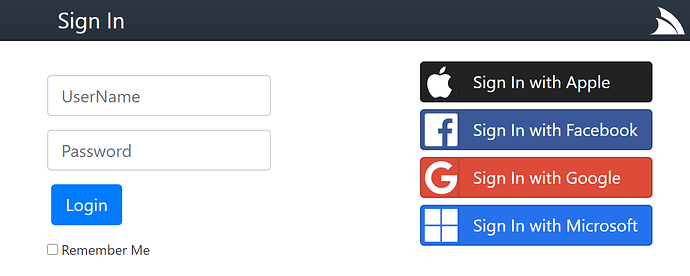Happy to announce the initial release of the new AppleAuthProvider for anyone wanting to accept Sign In with Apple logins in your ServiceStack Web App.
As the elliptic curve algorithms required to integrate with Sign In with Apple requires .NET Core 3 APIs the AppleAuthProvider is implemented in the ServiceStack.Extensions v5.9.3+ NuGet Package that’s now on MyGet.
Sign In with Apple Requirements
- Membership Team ID from https://developer.apple.com/account/#/membership/
- Create & configure App ID from https://developer.apple.com/account/resources/identifiers/list
- Use App ID to create & configure Service ID from https://developer.apple.com/account/resources/identifiers/list/serviceId
- Use App ID to create & configure Private Key from https://developer.apple.com/account/resources/authkeys/list
Note: Service ID must be configured with non-localhost trusted domain and HTTPS callback URL, for development you can use:
- Domain:
localtest.me - Callback URL:
https://localtest.me:5001/auth/apple
Okta has a good walkthrough explaining Sign In with Apple and steps required to create the above resources.
Getting Started
You can either clone or fork the NetCoreApps/AppleSignIn repo, alternatively you can download the latest master .zip with:
$ x download NetCoreApps/AppleSignIn
To configure Sign In with Apple, create the above resources in your developer account and use it to populate the oauth.apple.* settings in appsettings.json:
{
"oauth.apple.RedirectUrl": "https://localtest.me:5001/",
"oauth.apple.CallbackUrl": "https://localtest.me:5001/auth/apple",
"oauth.apple.TeamId": "{Team ID}",
"oauth.apple.ClientId": "{Service ID}",
"oauth.apple.KeyId": "{Private KeyId}",
"oauth.apple.KeyPath": "AuthKey_{Private KeyId}.p8",
}
Then after copying your Private Key into the web Content Folder you’re all set to run your App:
$ dotnet run
Then view your App using the non-localhost domain name:
https://localtest.me:5001/
You can then use the Embedded Login Page which renders the Sign In button for each of the registered OAuth providers in your AuthFeature:
Clicking on Sign in with Apple button should let you Sign In with Apple. After successfully signing in you can view the AllUsersInfo Service to view a dump of all User Sessions & User Auth Info stored in the registered RDBMS:
Create project with preferred Auth Configuration
Alternatively you can create a working project from scratch with your preferred configuration using the mix tool, e.g:
$ md web && cd web
$ x mix init auth-ext auth-db sqlite
This creates an empty project, with Auth Enabled, adds the ServiceStack.Extensions NuGet package, registers OrmLite, SQLite and the OrmLiteAuthRepository.
Then configure your OAuth providers in appsettings.json:
{
"oauth.apple.RedirectUrl": "https://localtest.me:5001/",
"oauth.apple.CallbackUrl": "https://localtest.me:5001/auth/apple",
"oauth.apple.TeamId": "{Team ID}",
"oauth.apple.ClientId": "{Service ID}",
"oauth.apple.KeyId": "{Private KeyId}",
"oauth.apple.KeyPath": "AuthKey_{Private KeyId}.p8",
}
Then copy your Apple Private Key to your Apps Content Folder before running your App then Signing In at https://localtest.me:5001/login
Advanced Configuration
The behavior of the AppleAuthProvider can be further customized with the following configuration:
public class AppleAuthProvider
{
// Apple Developer Membership Team ID
// appsettings: oauth.apple.TeamId
public string TeamId
// Service ID
// appsettings: oauth.apple.ClientId
public string ClientId
// The Private Key ID
// appsettings: oauth.apple.KeyId
public string KeyId
// Path to .p8 Private Key
// appsettings: oauth.apple.KeyPath
public string KeyPath
// Base64 of .p8 Private Key bytes
// appsettings: oauth.apple.KeyBase64
public string KeyBase64
// .p8 Private Key bytes
public byte[] KeyBytes
// Customize ClientSecret JWT
public Func<AppleAuthProvider, string> ClientSecretFactory
// When JWT Client Secret expires, defaults to Apple Max 6 Month Expiry
// default: 6 months in secs
// appsettings: oauth.apple.ClientSecretExpiry
public TimeSpan ClientSecretExpiry
// Apple's public keys, defaults to https://appleid.apple.com/auth/keys
// appsettings: oauth.apple.IssuerSigningKeysJson
public string IssuerSigningKeysJson
// Whether to cache private Key if loading from KeyPath,
// default: true
// appsettings: oauth.apple.CacheKey
public bool CacheKey
// Whether to cache Apple's public keys
// default: true
// appsettings: oauth.apple.CacheKey
public bool CacheIssuerSigningKeys
// Provide custom DisplayName resolver function when not sent by Apple
public Func<IAuthSession,IAuthTokens, string> ResolveUnknownDisplayName
}
